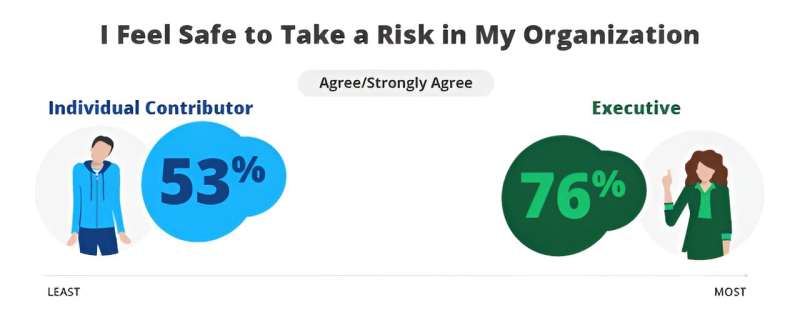This article has been reviewed according to Science X's editorial process and policies. Editors have highlighted the following attributes while ensuring the content's credibility:
fact-checked
trusted source
proofread
Executives feel more psychologically safe taking risks at work than employees

New survey data from Wiley suggest workers are far less likely than their managers and senior-level executives to feel psychologically safe taking risks at work. The findings from the latest Wiley Workplace Intelligence report show a particularly wide gulf between individual contributors and executives, which could lead to lower trust, engagement and productivity in the workplace.
Psychological safety—a term first coined by Harvard Business School professor Amy Edmondson—refers to an environment where individuals can freely express ideas, voice concerns, take risks and admit mistakes without fear of repercussions. It's recognized as a key factor in fostering healthy workplace environments.
According to Wiley's latest research, only 53% of individual contributors said they feel safe taking risks at their organizations, compared to 64% of managers, 55% of supervisors, 71% of directors and 76% of executives.
Nearly one-fifth of individual contributors didn't feel safe taking risks, the highest of all respondents.
"Psychological safety has become increasingly important in recent years with the shift to hybrid and remote work," said Dr. Mark Scullard, senior director of product innovation at Wiley. "To bridge the gaps in psychological safety that we're seeing across organizational levels, companies can implement facilitated learning experiences to equip all employees with the skills for effective relationships, better communication, understanding, trust and teamwork. This intentional and inclusive approach helps foster greater psychological safety within the workplace that allows innovation to thrive."
Other key findings from the report include:
- Blame Game: At least 40% of respondents in higher-level positions (supervisors, directors and executives) indicated that their mistakes were held against them, possibly due to their increased visibility across the organization, compared to individual contributors (29%) and managers (35%).
- Comfort with Discomfort: A majority of middle management respondents said they largely feel able to raise problems and tough issues at work, while individual contributors and executives both felt less comfortable bringing up such issues.
- Undermining Concerns: Supervisors were the least of all respondents to agree that no one on their teams would deliberately undermine their work (68%).
- Higher Psychological Safety in Senior Roles: Executives reported having the highest levels of psychological safety at work, with 93% feeling mostly or completely psychologically safe. Individual contributors and managers reported lower levels of psychological safety at 86% each, and felt less safe speaking up and less valued for their contributions.
The findings were gathered in a survey conducted by Wiley among 2,000 professionals across organizational roles and departments within various industries in North America. Survey responses were collected anonymously and compiled in aggregate form.
Provided by Wiley





















